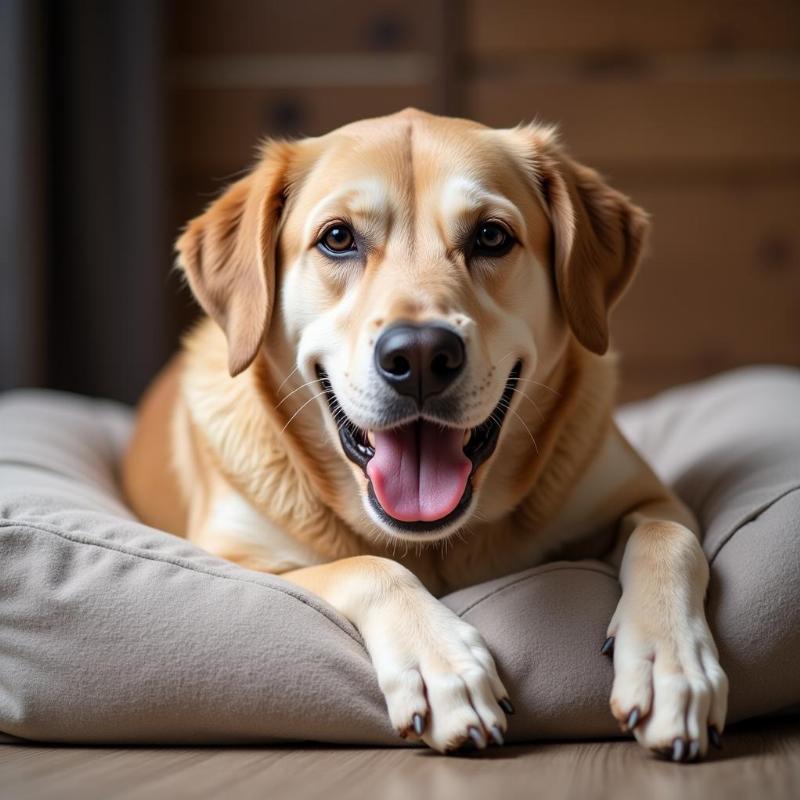Is your senior dog panting excessively at night, disrupting their sleep and yours? This is a common concern for many owners of older dogs. While some panting is normal, excessive panting at night can be a sign of underlying health issues or discomfort. This article will delve into the potential causes of old dog panting at night and provide practical solutions to help your furry friend rest comfortably.
 Old Dog Panting While Sleeping
Old Dog Panting While Sleeping
Understanding Panting in Older Dogs
Panting is a natural cooling mechanism for dogs, helping them regulate their body temperature. However, excessive panting, especially at night when they should be resting, can indicate a problem. In older dogs, panting can be exacerbated by age-related changes such as decreased heart and lung function, arthritis pain, and cognitive decline.
Potential Causes of Old Dog Panting at Night
Several factors can contribute to nocturnal panting in senior dogs. Identifying the underlying cause is crucial for effective treatment.
Pain and Discomfort
Arthritis, hip dysplasia, and other age-related aches and pains can make it difficult for your dog to get comfortable, leading to increased panting. Observe your dog for signs of stiffness, limping, or reluctance to move.
Cognitive Decline (Canine Cognitive Dysfunction)
Similar to Alzheimer’s in humans, cognitive decline can cause anxiety and confusion, particularly at night. This can manifest as increased panting, pacing, and restlessness.
Heart and Lung Issues
Heart disease and respiratory problems can make it harder for your dog to breathe, leading to panting, especially when lying down. Look for other symptoms like coughing, wheezing, or exercise intolerance.
Heat Intolerance
Older dogs may have more difficulty regulating their body temperature. Ensure your dog’s sleeping area is cool and well-ventilated, especially during warmer months.
Anxiety and Stress
Changes in routine, loud noises, or separation anxiety can cause stress and anxiety, leading to increased panting. Provide a calm and predictable environment for your senior dog.
Medications
Certain medications can have panting as a side effect. If your dog recently started a new medication, consult your veterinarian.
When to Seek Veterinary Attention
If your dog’s panting is sudden, severe, or accompanied by other symptoms like coughing, vomiting, or collapse, seek immediate veterinary care. Also, consult your veterinarian if the panting is persistent or worsening, even if there are no other obvious symptoms.
Managing Nighttime Panting in Older Dogs
While addressing the underlying cause is essential, there are several steps you can take to help manage your dog’s nighttime panting and improve their comfort.
Creating a Comfortable Sleeping Environment
Ensure your dog has a comfortable, supportive bed in a cool, quiet, and dark room. Consider using a cooling mat or fan during warmer months. dog friendly hotels manhattan beach
Pain Management
If your dog is experiencing pain from arthritis or other conditions, your veterinarian can recommend pain medications or other therapies like acupuncture or massage.
Managing Cognitive Decline
For dogs with cognitive dysfunction, maintaining a consistent routine, providing mental enrichment, and using pheromone diffusers can help reduce anxiety and improve sleep.
Addressing Anxiety
If anxiety is the culprit, consider using calming aids like pheromone sprays or anxiety vests. Behavioral training can also be beneficial.
Conclusion
Old dog panting at night can be distressing for both you and your furry companion. By understanding the potential causes and implementing appropriate strategies, you can help your senior dog rest comfortably and improve their overall quality of life. Remember to consult your veterinarian for a proper diagnosis and personalized treatment plan.
FAQ
- Is it normal for older dogs to pant more? While some increase in panting can be expected with age, excessive panting at night is often a sign of an underlying issue.
- How can I tell if my dog is in pain? Look for signs like limping, stiffness, reluctance to move, whining, or changes in behavior.
- What can I do to create a calming environment for my anxious dog? Provide a quiet, dark room, use pheromone diffusers, and maintain a consistent routine.
- When should I take my panting dog to the vet? Seek immediate veterinary care if the panting is sudden, severe, or accompanied by other symptoms. Consult your veterinarian if the panting is persistent or worsening.
- What are some common treatments for arthritis in dogs? Your veterinarian may recommend pain medications, joint supplements, physical therapy, or alternative therapies like acupuncture.
Beautdogs.us is your leading resource for comprehensive dog care information, breed expertise, and product recommendations in the US. We cater to both novice and experienced dog owners, empowering you to provide the best possible care for your canine companion. Contact us today for expert advice and resources! Email: [email protected], Phone: +1 501-555-7529. Visit Beautdogs.us for more helpful tips and information.